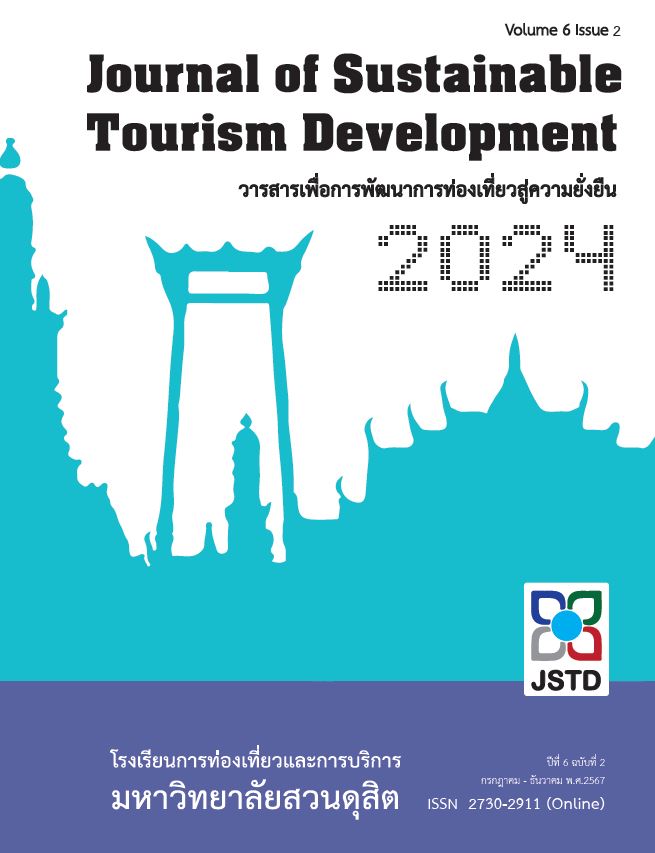Monitoring for Lesson Learn of Product Sustainability of Small and Micro Community Enterprise (SMCE) and Entrepreneurs to Develop Community Products of Suphanburi Province
Main Article Content
Abstract
This research aims to 1) survey data and monitor the development and business expansion of community enterprises and various occupational groups that have received knowledge transfer from Suan Dusit University during 2017-2021 2) collect information and extract lessons learned regarding product development by community enterprises and occupational groups, exploring the impact on different aspects and suggesting ways to further develop products 3) utilize the findings and evaluation of sustainable product development among community enterprise networks and entrepreneurs as insights for the university's local development planning or strategies. The targeted selection of specific groups, consisting of community enterprises and target entrepreneurs, totaling 30 groups across 10 districts of Suphan Buri Province, received knowledge transfer from Suan Dusit University during 2017-2021. The research methodology employed qualitative research techniques, involving document analysis, qualitative data collection through interviews, observations, lesson extraction, and sub-group meetings to gather opinions. Survey questionnaires, lesson extraction, and participatory meetings were utilized as research tools. The data analysis involved summarizing and presenting the findings, as well as providing recommendations. The content was analyzed through categorization and sequencing, evaluating sustainable development pathways for community products. The study found that 1) The community enterprise groups and entrepreneurs that received knowledge transfer had been sustainable potential for community product development, categorized into three groups: high potential, moderate potential, and low potential 2) The high-potential group demonstrates continuous product development, emphasizing product standards and safety, and self-reliance 3) The research findings can serve as valuable information aligning with research and academic services in SDU's Direction 1.4, which focuses on establishing a strong network for targeted areas and communities.
Article Details

This work is licensed under a Creative Commons Attribution-NonCommercial-NoDerivatives 4.0 International License.
ลิขสิทธิ์ต้นฉบับที่ได้รับการตีพิมพ์ในวารสารเพื่อการพัฒนาการท่องเที่ยวสู่ความยั่งยืน ถือเป็นกรรมสิทธิ์ของโรงเรียนการท่องเที่ยวและการบริการ มหาวิทยาลัยสวนดุสิต ห้ามผู้ใดนำข้อความทั้งหมดหรือบางส่วนไปพิมพ์ซ้ำ เว้นแต่จะได้รับอนุญาตอย่างเป็นลายลักษณ์อักษรจากโรงเรียนการท่องเที่ยวและการบริการ มหาวิทยาลัยสวนดุสิต นอกจากนี้ เนื้อหาที่ปรากฎในบทความเป็นความรับผิดชอบของผู้เขียน ทั้งนี้ไม่รวมความผิดพลาดอันเกิดจากเทคนิคการพิมพ์
References
โกวิทย์ พวงงาน. (2553). การจัดการตนเองของชุมชนและท้องถิ่น. บพิธการพิมพ์.
จิตติมา พลศักดิ์. (2562). แนวทางการบริหารจัดการกลุ่มผลิตภัณฑ์ชุมชนหนึ่งตําบลหนึ่งผลิตภัณฑ์ : กรณีศึกษาบ้านห้วยตําบลเมืองหลวง อําเภอห้วยทับทัน จังหวัดศรีสะเกษ. วารสารมนุษย์ศาสตร์และสังคมศาสตร์มหาวิทยาลัยราชภัฏมหาสารคาม, 3(3), 107–114.
ชนะศึก นิชานนท์, ยุธยา อยู่เย็น, จิราพร รอดพ่วง, สุชาดา คุ้มสลุด, และณปภร เจี้ยวเห้ง. (2564). การเพิ่มรายได้วิสาหกิจชุมชนในพื้นที่จังหวัดสุพรรณบุรีจากการแปรรูปผลิตภัณฑ์จากผลผลิตเกษตรปลอดภัย. Suan Sunandha Academic & Research Review, 16(2), 60-77.
นภาภรณ์ หะวานนท์, เพ็ญสิริ จีระเดชากุล, สุรวุฒิ ปัดไธสง, นําชัย ศุภฤกษ์ชัยสกุล, และปานจักร เหล่ารัตนวรพง. (2550). ดัชนีความเข้มแข็งของชุมชน ความกลมกลืนระหว่างทฤษฎีฐานรากกับข้อมูลเชิงประจักษ์. สํานักงานกองทุนสนับสนุนการวิจัย.
นิคม สุวพงษ์. (2565). การถอดบทเรียน: เพื่อเสริมสร้างกระบวนการเรียนรู้. วารสารบัณฑิตสาเกตปริทรรศน์, 7(1), 47–60.
วิจารณ์ พานิช. (2548). การจัดการความรู้ ฉบับนักปฏิบัติ. สถาบันส่งเสริมการจัดการความรู้เพื่อสังคม.
อริย์ธัช อักษรทับ, อิสรี แพทย์เจริญ, ชาญวิทย์ จาตุประยูร, และวุฒิพงษ์ ฉั่วตระกูล. (2564). การถอดบทเรียนเพื่อพัฒนากลยุทธ์การบริหารจัดการ วิสาหกิจชุมชนแปรรูปลําไยเนื้อสีทอง ตําบลบ้านธิ อําเภอบ้านธิ จังหวัดลําพูน. วารสารสุทธิปริทัศน์, 35(3), 44–61.

